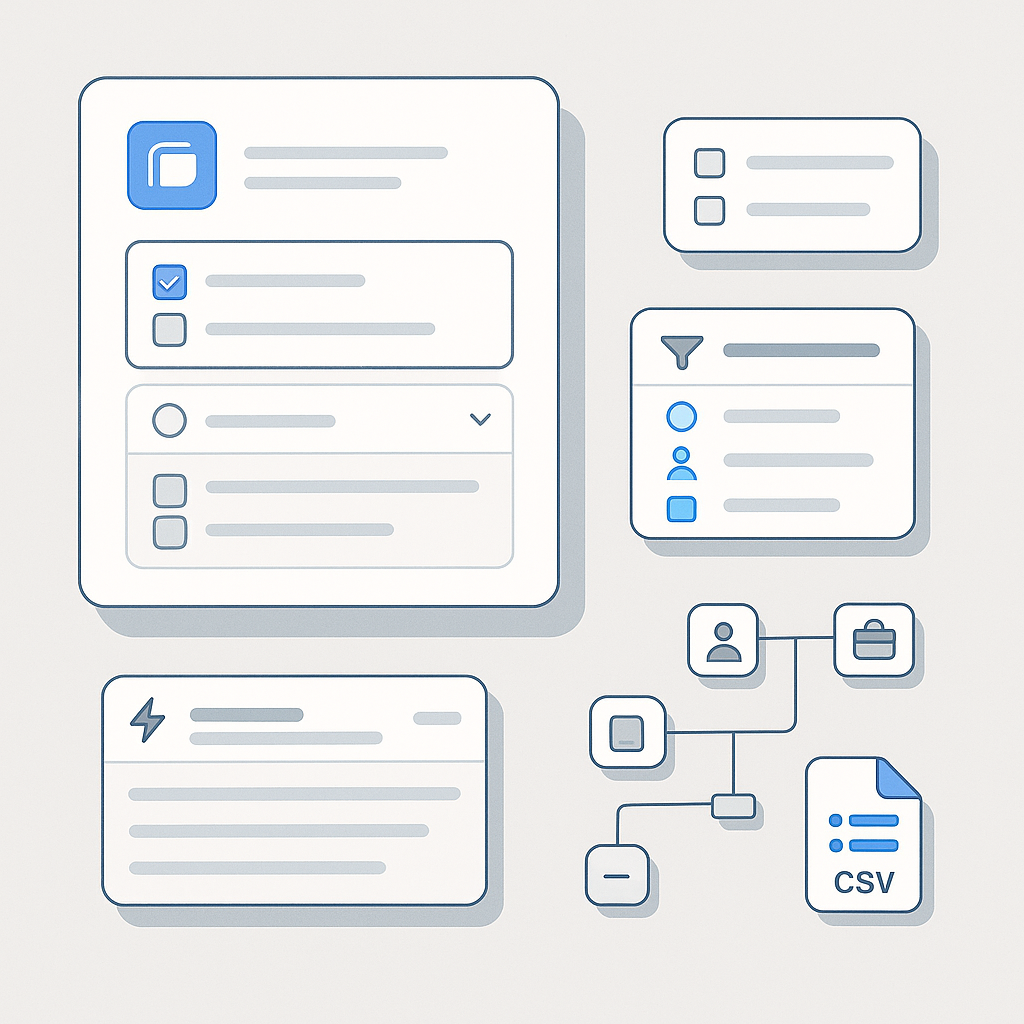I. Introduction: Cracking the Code of Supply Chain Sales
Let's be honest: we've all been there. It's the holiday season, you're ready to click "buy" on that perfect gift, and BAM—the dreaded "out of stock" message pops up. Suddenly, the festive cheer evaporates, replaced by a sinking feeling of disappointment. This, my friends, is the power (and potential pitfall) of the supply chain. Behind the scenes, Supply Chain Managers (SCMs) are the unsung heroes (or villains, depending on the stock levels) orchestrating the intricate dance of products from factory floors to your eager hands.
But selling to these tech-savvy, ROI-obsessed masterminds can feel like pitching a tent in a hurricane. Their inboxes are bombarded with a relentless barrage of sales pitches, each promising to be the silver bullet solution to all their supply chain woes. It's enough to make anyone reach for the "mark as spam" button faster than you can say "logistics optimization."
Fear not, intrepid sales and marketing warriors, for this page is your comprehensive guide to not just surviving, but thriving in the exciting world of supply chain sales. We'll delve into the minds of modern SCMs, uncovering their evolving priorities and pain points. You'll learn how to craft laser-focused value propositions that speak their language (hint: it involves data, and lots of it). And we'll arm you with battle-tested email templates and outreach strategies to transform your inbox from a wasteland of ignored messages to a hotbed of engaged prospects. Get ready to level up your game and unlock the secrets to supply chain sales success!
II. Understanding Your Audience: The Modern Supply Chain Manager
Forget the outdated image of SCMs as glorified spreadsheet jockeys, solely focused on shaving pennies off shipping costs. Today's SCM is a strategic maestro, a conductor of complex global networks, a data-driven decision-maker who can spot a bottleneck faster than you can say "just-in-time inventory." They're not just moving boxes; they're optimizing every step of the journey, from raw materials to customer satisfaction.
So, what keeps these supply chain gurus up at night? Supply Chain Dive reveals that modern SCMs are laser-focused on:
- Resilience and Agility: In an era of unprecedented disruption (think pandemics, geopolitical turmoil, or even a certain ship stuck in a certain canal), the ability to anticipate, adapt, and overcome challenges is paramount. SCMs are looking for solutions that make their supply chains as flexible and shock-proof as a yoga instructor on a trampoline.
- End-to-End Visibility: Imagine having a real-time, Google Maps-like view of your entire supply chain, from the moment a raw material leaves a supplier's warehouse to the second it arrives on a customer's doorstep. That's the level of transparency and control modern SCMs crave. They need solutions that provide actionable insights into every stage of the journey, enabling them to make proactive decisions and keep things running smoothly.
- Technology Adoption: The days of relying on spreadsheets and gut feelings are long gone. Today's SCMs are embracing the power of AI, machine learning, and automation to optimize processes, gain a competitive edge, and free up their time to focus on strategic initiatives (like finally taking that well-deserved vacation).
This data-driven mindset is transforming how SCMs evaluate solutions. As Trinetix reports, "McKinsey found that AI-powered forecasting in supply chains can cut errors by 30-50%." That's right, folks—we're talking about real, measurable results that impact a company's bottom line. Your pitch needs to resonate with this analytical approach, demonstrating tangible value through data, case studies, and real-world examples.
III. Crafting Your Value Proposition: Speak Their Language
Imagine trying to sell a gourmet, five-course meal to someone who subsists solely on instant ramen noodles. You wouldn't lead with the intricate plating techniques or the exotic ingredients; you'd focus on the mouthwatering flavors, the satisfying portions, and the sheer joy of a delicious, well-prepared meal. Similarly, selling to SCMs requires speaking their language—one that prioritizes problem-solving, quantifiable benefits, and a healthy dose of data-driven evidence.
Instead of bombarding them with a laundry list of features, paint a vivid picture of the challenges they face and the impact those challenges have on their business. For example, "What's the cost of a single stockout? How much revenue walks out the door when a shipment is delayed? Now, imagine a solution that not only mitigates those risks but also unlocks hidden efficiencies you didn't even know existed." This approach makes the problem tangible and positions your solution as the hero they've been waiting for.
Remember, SCMs are allergic to vague promises and fluffy marketing jargon. They crave concrete evidence and measurable results. Instead of saying, "Our platform improves visibility," quantify the impact: "Our platform helped Company X reduce stockouts by 65% and lower warehousing costs by 10%, as reported by Trinetix." This data-driven approach transforms your pitch from a salesy monologue into a compelling conversation grounded in real-world results.
Finally, don't be shy about showcasing your successes. Highlight how your solution has helped companies similar to theirs overcome challenges, optimize their supply chains, and achieve impressive results. Did you help a manufacturer reduce lead times by 20%? Did you enable a retailer to optimize their inventory and reduce waste by 15%? These real-world success stories are the secret sauce that makes your pitch irresistible.
IV. Email Outreach Strategies: Cut Through the Clutter
In the digital age, where attention spans are shorter than a goldfish with ADHD, a generic "We can help you with your supply chain" email is about as effective as a screen door on a submarine. To capture an SCM's attention, your outreach needs to be as strategic and well-oiled as the supply chains they manage. This means embracing the power of personalization, crafting subject lines that sing, and structuring your emails for maximum impact.
Personalization is no longer a nice-to-have; it's the bare minimum. In fact, a recent study found that 72% of B2B customers expect fully or mostly personalized content. This means going beyond the tired old "[First Name] merge tag" and demonstrating that you've done your homework. Mention a recent industry article they might find insightful, reference a challenge their company is facing, or highlight a connection you share on LinkedIn. These small touches signal that you're not just blasting a generic message; you're engaging in a thoughtful, personalized conversation.
Your subject line is your first (and often only) chance to make a good impression. In a crowded inbox, a bland subject line is like a plain donut in a bakery window—easily overlooked and quickly forgotten. Instead, use data-backed strategies to pique their curiosity and entice them to take a bite. Here are a few examples:
- Use Numbers or Statistics: "See How [Company X] Cut Supply Chain Costs by 15%"
- Highlight a Key Benefit or Offer: "Streamline Your Logistics with AI-Powered Visibility"
- Create a Sense of Urgency: "Don't Let Supply Chain Disruptions Derail Your Growth"
Once you've snagged their attention, structure your email body to deliver value quickly and concisely. Remember, SCMs are busy people; they don't have time to wade through paragraphs of fluff. Here are a few effective frameworks:
- Problem-Agitate-Solution (PAS): Start by presenting a relatable problem, agitate the pain points, and then position your solution as the much-needed solution.
- Case Study-Driven: Lead with a compelling success story about a similar company, highlighting the challenges, solutions, and quantifiable outcomes.
- Direct Value Proposition: Clearly and concisely state the key benefits of your solution, backing up your claims with data and proof points.
V. Email Templates: Ready to Deploy
Here are a few battle-tested email templates to jumpstart your outreach:
Template 1: The "Disruption-Proofing" Pitch
Subject: Is Your Supply Chain Ready for 2025's Challenges?
Body:
Hi [Prospect Name],
The global supply chain landscape is evolving faster than ever before. Disruptions are becoming the norm, as highlighted by the ongoing impact of geopolitical events on global trade.
In this environment, resilience and agility are no longer optional; they're essential for survival. [Your company/solution] helps businesses like yours navigate these challenges by providing real-time visibility into supply chain risks and enabling flexible sourcing options.
Would you be open to a quick call next week to discuss how we can help you build a supply chain that's as agile as a gymnast and as resilient as a diamond?
Best regards,
[Your Name]
Template 2: The Data-Driven Efficiency Play
Subject: Unlock Hidden Efficiencies in Your Supply Chain
Body:
Hi [Prospect Name],
Did you know that 76% of companies that have implemented AI-powered forecasting have reduced logistics costs?
At [Your Company], we empower businesses to unlock these hidden efficiencies by providing real-time insights into inventory levels and automating key processes. For example, we recently helped [Company X] achieve a 15% reduction in logistics costs by optimizing their transportation routes and reducing warehouse storage costs.
Are you interested in exploring how we can help you uncover similar opportunities for improvement and drive tangible results?
Best regards,
[Your Name]
Template 3: The "Peer-Driven" Case Study Approach
Subject: How [Similar Company] Optimized Their Logistics with [Your Solution]
Body:
Hi [Prospect Name],
[Similar Company], a leading [industry] company facing supply chain disruptions, was able to reduce shipping costs by 20% by implementing [Your Solution].
By implementing our AI-powered forecasting solution, [Similar Company] was able to reduce their inventory holding costs by 15% and improve their on-time delivery rate to 98%.
We'd love to share how we can help you achieve similar success and transform your supply chain into a competitive advantage. Are you available for a quick call next week to explore the possibilities?
Best regards,
[Your Name]
VI. Nurturing the Relationship: It's a Marathon, Not a Sprint
In the world of B2B sales, especially when dealing with strategic decision-makers like SCMs, patience is not just a virtue; it's a superpower. A single email, no matter how brilliantly crafted, is rarely enough to close a deal. Instead, view your outreach as the start of a long-term relationship built on trust, value, and consistent engagement. Think of it like wooing a potential partner—you wouldn't propose on the first date, would you?
One of the most effective ways to nurture this relationship is through value-added follow-ups. Instead of bombarding SCMs with generic sales pitches, shower them with content they'll find genuinely insightful and relevant to their role. Think industry reports, webinars on emerging supply chain trends, or case studies showcasing tangible ROI. This approach positions you as a trusted advisor, not just another vendor vying for their attention. And it works! Research shows that personalized emails are opened 82% more than generic bulk-send emails.
Remember, SCMs often have long sales cycles. Their decisions impact multiple departments and require careful consideration. By consistently delivering value, addressing their concerns, and demonstrating your expertise, you'll build the trust and credibility needed to stay top-of-mind throughout their decision-making process.
VII. Measuring Your Success: Track, Analyze, Optimize
In the data-driven world of supply chain management, intuition alone won't cut it. To maximize your impact and ensure your outreach resonates, you need to track, analyze, and continuously optimize your efforts based on real-time data. Think of it like fine-tuning a high-performance engine—you need to constantly monitor the gauges and make adjustments to achieve peak performance.
Start by monitoring key email metrics:
- Open Rates: Are your subject lines compelling enough to break through the clutter? A low open rate might indicate that your subject lines are too generic or not relevant to your target audience.
- Click-Through Rates: Is your email copy engaging and relevant, leading prospects to take action? If your click-through rate is low, it might be time to revisit your email copy and make sure it's clear, concise, and compelling.
- Meeting Booked Rates: Is your call to action clear, concise, and compelling? A low meeting booked rate could mean that your call to action is buried in the email or not strong enough to encourage prospects to take the next step.
- Pipeline Generated: How many qualified leads are entering your sales pipeline as a result of your outreach? This is the ultimate measure of your success, as it reflects how effectively your outreach is translating into real business opportunities.
Don't be afraid to experiment and iterate based on the data you gather. A/B test different subject lines, email copy variations, and calls to action to see what resonates best with your target audience. Remember, what works for one company might not work for another. The key is to continuously refine your approach based on real-world results.
VIII. Conclusion: Mastering Supply Chain Sales in the Digital Age
Selling to Supply Chain Managers in today's digital landscape requires a strategic, data-driven approach that prioritizes personalization, value, and long-term relationship building. By understanding their priorities, speaking their language, and consistently delivering relevant insights, you can transform your outreach from easily ignored to eagerly anticipated.
Remember these key takeaways:
- Deeply understand your audience: Today's SCM is a strategic decision-maker, driven by data and focused on resilience, efficiency, and visibility. They're not looking for quick fixes; they're seeking long-term solutions that will optimize their entire supply chain.
- Craft a data-driven value proposition: Translate features into tangible ROI, using data and proof points to back up your claims. SCMs are skeptical by nature; they need to see the numbers to believe it.
- Personalize your outreach: Go beyond basic merge tags and demonstrate that you've done your homework, tailoring your message to their specific needs and challenges. Show them that you understand their business and that you're not just sending a generic sales pitch.
- Nurture the relationship: Provide ongoing value through relevant content and insights, positioning yourself as a trusted advisor. Building a strong relationship takes time and effort, but it's essential for long-term success in supply chain sales.
- Measure, analyze, and optimize: Track key metrics, A/B test different approaches, and continuously refine your strategy based on real-world results. The digital landscape is constantly evolving, so it's important to stay agile and adapt your approach as needed.
By embracing these principles, you can master the art of supply chain sales, engage SCMs effectively, and drive meaningful conversations that lead to long-term partnerships.
About Autobound
Autobound's leading AI-powered platform delivers 350+ unique insights for go-to-market teams from financial filings, social media activity, 35 news events, competitor trends, job changes and more. Trusted by 7,000+ companies including TechTarget and validated by 220+ 5-star G2 reviews, we're unlocking hyper-personalization at scale, with native integrations for Salesloft, Outreach, and more. Leverage our developer-friendly API, try our Chrome extension, try our platform free, or contact our team to eliminate guesswork and drive measurable growth →
Built with love in San Francisco, CA




